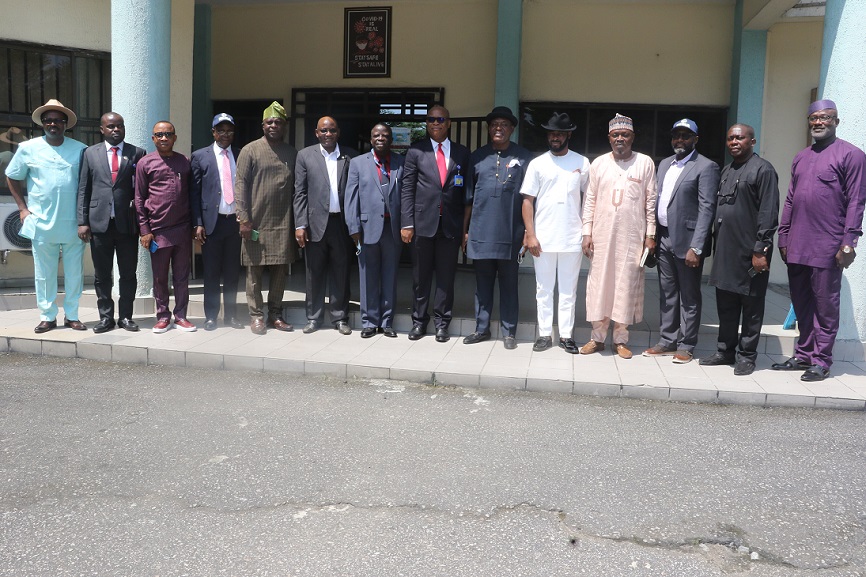
FEATURED NEWS
Stakeholders Call for Inclusive Disaster Risk Reduction in Nigeria at CDRMDS Confab
- Details
- Published: 28 November 2021

By Sunny Dada
Emergency and Disaster Risk Management stakeholdsers have called for an inclusive disaster risk management approach in Nigeria. The call was made at the just-concluded 3rd Biennial Regional Conference on Disaster Risk Reduction in Nigeria, held on November 15–16, 2021, at the Ebitimi Banigo Auditorium.
The conference which had in attendance the academia, practitioners and policymakers, was organised by the Centre for Disaster Risk Management and Development Studies (CDRMDS) in collaboration with the National Emergency Management Agency (NEMA).
In his welcome remark, the Vice Chancellor Professor Georgewill Owunari, who was represented by the Deputy Vice Chancellor (Research and Development), Professor Iyeopu Siminialayi, welcomed the participants to the University of Port Harcourt and applauded the CDRMDS and NEMA for the conference. The Vice Chancellor who expressed his delight that Nigeria was taking a leading role at the 2021 United Nations Climate Change Conference (COP26), stated that the biennial conference was coming at a time when there is a global focus on climate and environmental disasters.
Describing disasters as an indicator of poor risk management, the Vice Chancellor pleaded with stakeholders to re-examine current approaches to disaster risk management in order to achieve global milestones in the mitigation of risks and disasters occasioned by human activities.
Earlier, the immediate past Acting Vice Chancellor, Professor Stephen Okodudu, who was also the Chairman of the event, described the University of Port Harcourt as a unique institution due to its location “in a fragile eco-system.” Professor Okodudu who emphasised the need for the strict implementation of environmental laws and policies in Nigeria, stated that disaster risk management must begin “with the understanding that man must cooperate with the environment by protecting it from harmful practices.”
Speaking on the objectives of the conference and the extent of collaboration between CDRMDS and NEMA, the Director General of NEMA, Alhaji Habib Ahmed who was represented by the Liaison Officer to the National Assembly, disclosed that NEMA was proud to adopt the CDRMDS as a centre of excellence. While noting that the agency has transited from a relief agency to a disaster management institution, the Director General stated, however, that there was a need for the fusion of efforts to address the worsening environmental challenges faced by Nigeria. He, therefore, urged conferees to be mindful of critical environmental challenges in the Niger Delta when making their contributions.
In a similar vein, the Vice Chairman, Senate Committee on Special Duties, Senator Degi Eremiyo, noted that there was need to translate several “talk-shops” into practical actions. He bemoaned the failure of government to adequately harness the massive mineral resources that abound in the country, stating that Nigeria could not have had any reason to borrow if it had adequately harnessed her rich environmental resources across the six geo-political regions. He pleaded with participants to take advantage of the conference to provide templates of collaborative research that would address the myriad of environmental challenges bedevilling the Niger Delta.
Delivering the keynote address entitled: “Reducing Disaster Risk, Improving Humanitarian Actions,” the Director General of the FCT Emergency Management Agency, Mr Abbas Idriss, regretted that the “demands of nature and activities of man continue to create humanitarian risk challenges.” He said despite the avalanche of risk management experts in the country, the unabated increase in disaster risk challenges continue to pose serious threats and further complicate humanitarian challenges.
Mr Idriss stated that experience had shown that it is much easier and less costly to prevent disaster risks than to manage such risks when they occur. He called for an inclusive disaster risk prevention and management approach in order to get community buy-in. The Director General, who argued that it is impossible to achieve a sustainable risk reduction without the active participation of communities, emphasised the need for NEMA and other relevant agencies to prioritise communities in both resource allocation and capacity building efforts.

